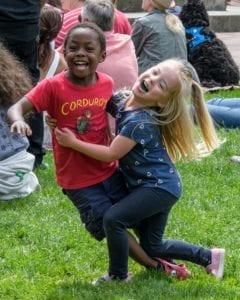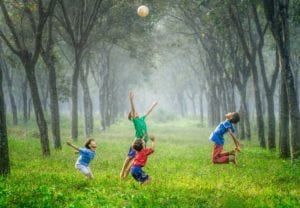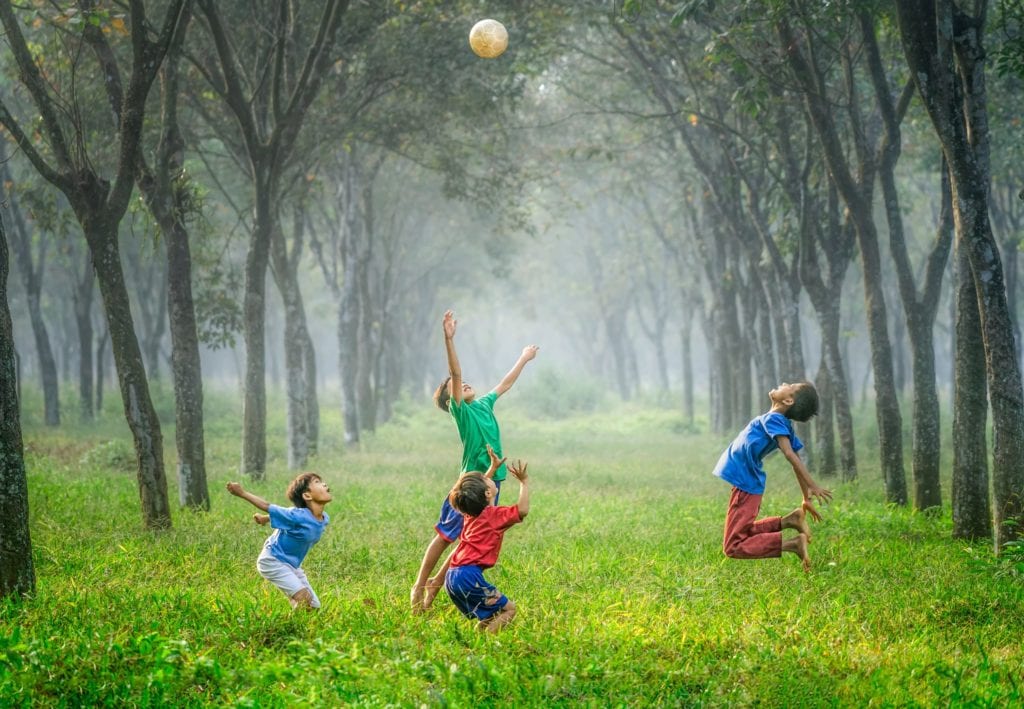It seems particularly salient to be talking about play right now, whilst we’re in the middle of our third national lockdown and in some ways, play is the last thing on many of our minds. But here at The Outdoors Group, we’d argue that play is exactly what our children need right now. This sentiment is shared with those behind the Global School Play Day who are aiming to restore unstructured play to a generation of kids. They say ‘In his TEDx lecture, Peter Gray clearly argues the case that today’s kids do not grow up playing and this has negatively impacted them in many ways. It’s time we return the gift of play to this generation.’
 What is Play?
What is Play?
So when we talk about play, what exactly do we mean? Play is unstructured, child-led activity without any interference or motive from adults. It is not carefully thought out ‘invitations to play’, it is not organised sport or craft activities, it is not a game initiated by adults (although all of these, of course, do have value). It is spontaneous play, for the sake of fun, started and led by children themselves. Play England’s definition of play is:
What children and young people do when they follow their own ideas and interests, in their own way, and for their own reasons.
Play can be indoors or outdoors. Play can use toys or other household items as props, or play can be simply fuelled by imagination. Play can happen alone or with others. Play is what happens shortly after our children, often used to every element of their lives being scheduled, declare ‘I’m bored!’. Play is what happens when happy, healthy children are left to their own devices.
Benefits of Play
But why is it so important that the UN would recognise it as a fundamental human right? There has been masses of research into why children play and how it helps (a good starting list can be found here) but we’ll look at a few key points now:
- Play nurtures creativity. The very nature of play engages a child’s creative self as they decide what to play and how they will follow through on their idea.
- Play is physical. More often than not, children are not static whilst they play! They are running, climbing, jumping and dancing throughout their games. This improves their coordination, their cardiovascular health, their balance and strength as well as their proprioception (sense of where they are in the physical world).
- Play is social. When playing with other children, play helps children connect with their siblings, friends and classmates. Their communication skills are utilised as they learn to negotiate, to communicate effectively and problem solve to reach an agreement on what to play and how to do so.
- Play is therapy. Children often use play as a safe space to explore things they are worried about in life. Whether this is the impending arrival of a new sibling, a house move or a poorly relative, play is the ideal arena for them to explore their feelings without repercussion. It can help reduce anxiety, stress and anger in children who are having a hard time.
- Play is learning. Often, children are learning without even realising whilst they play. Whether it’s reading, remembering or reasoning, there are a whole host of transferable skills that they gain through play.
- Play is fun. At the end of the day, isn’t this what really matters? Childhood is a fleeting part of our lives and as adults, all too often, responsibilities and worries prevent us from engaging in that carefree fun that is found in play. Shouldn’t we encourage our children to be full of joy, laughter and exploration, to play whilst they still can?
 Time to Play
Time to Play
In a time where uncertainty hangs like a dark cloud over daily life, now is the time to free your children to go and fully indulge in play! We understand that a lot of children have commitments to school that have to be met right now but once they’ve finished their learning, why not give yourself a break (the other benefit of true unstructured play!) and let them just go and play as soon as you can. Whether they’re getting absorbed in small world play with play-mobile, building incredible lego creations, playing a complicated fantasy role play game with their siblings or outside running around the garden like puppies let out for the first time…sit back, breathe and let them fully immerse themselves in the wonderful, beneficial and exciting world of play!
Author: Hannah Durdin, Forest School Leader & Administrator
Date: Wednesday 3rd February 2021

 What is Play?
What is Play? Time to Play
Time to Play







One Response